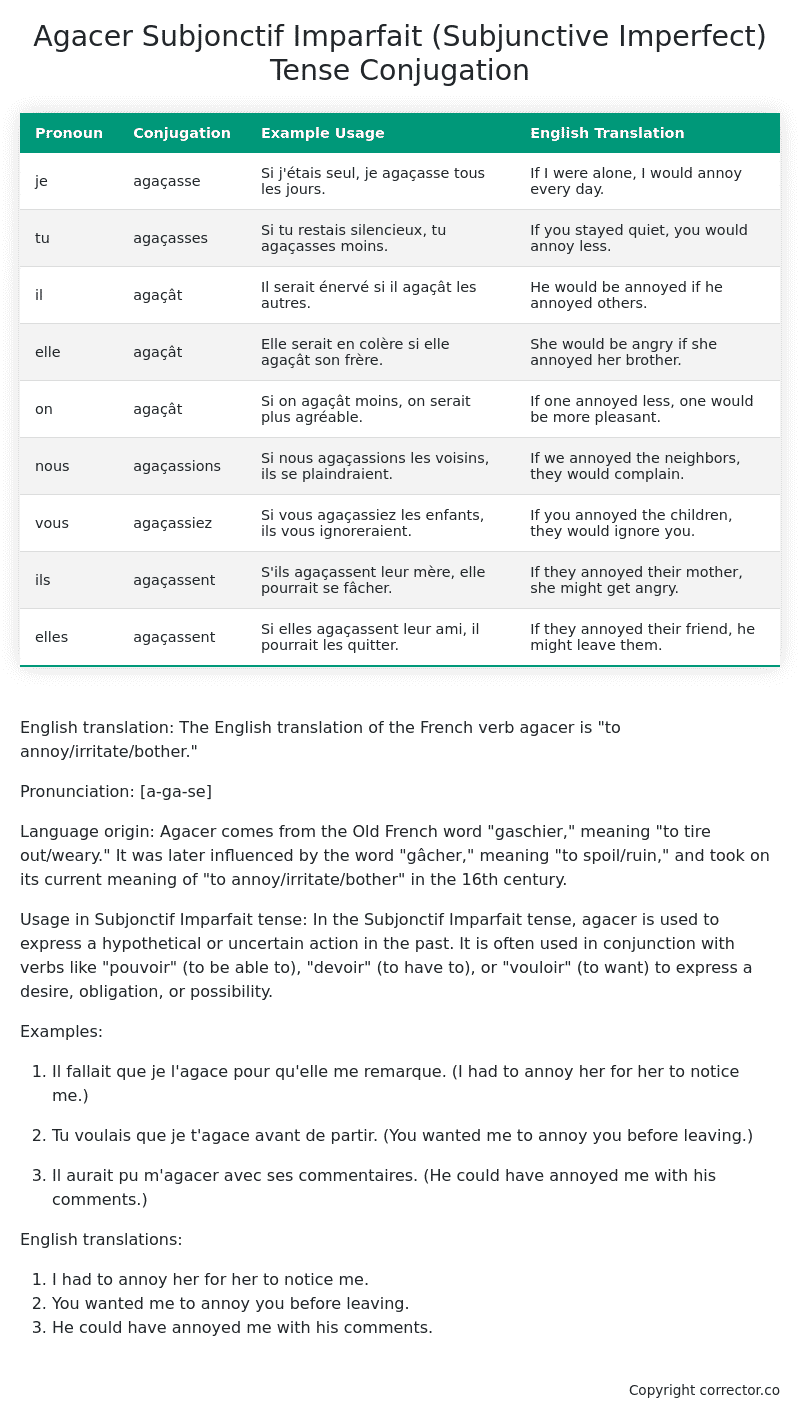Subjonctif Imparfait (Subjunctive Imperfect) Tense Conjugation of the French Verb agacer
Introduction to the verb agacer
English translation: The English translation of the French verb agacer is “to annoy/irritate/bother.”
Pronunciation: [a-ga-se]
Language origin: Agacer comes from the Old French word “gaschier,” meaning “to tire out/weary.” It was later influenced by the word “gâcher,” meaning “to spoil/ruin,” and took on its current meaning of “to annoy/irritate/bother” in the 16th century.
Usage in Subjonctif Imparfait tense: In the Subjonctif Imparfait tense, agacer is used to express a hypothetical or uncertain action in the past. It is often used in conjunction with verbs like “pouvoir” (to be able to), “devoir” (to have to), or “vouloir” (to want) to express a desire, obligation, or possibility.
Examples:
-
Il fallait que je l’agace pour qu’elle me remarque. (I had to annoy her for her to notice me.)
-
Tu voulais que je t’agace avant de partir. (You wanted me to annoy you before leaving.)
-
Il aurait pu m’agacer avec ses commentaires. (He could have annoyed me with his comments.)
English translations:
- I had to annoy her for her to notice me.
- You wanted me to annoy you before leaving.
- He could have annoyed me with his comments.
Table of the Subjonctif Imparfait (Subjunctive Imperfect) Tense Conjugation of agacer
| Pronoun | Conjugation | Example Usage | English Translation |
|---|---|---|---|
| je | agaçasse | Si j’étais seul, je agaçasse tous les jours. | If I were alone, I would annoy every day. |
| tu | agaçasses | Si tu restais silencieux, tu agaçasses moins. | If you stayed quiet, you would annoy less. |
| il | agaçât | Il serait énervé si il agaçât les autres. | He would be annoyed if he annoyed others. |
| elle | agaçât | Elle serait en colère si elle agaçât son frère. | She would be angry if she annoyed her brother. |
| on | agaçât | Si on agaçât moins, on serait plus agréable. | If one annoyed less, one would be more pleasant. |
| nous | agaçassions | Si nous agaçassions les voisins, ils se plaindraient. | If we annoyed the neighbors, they would complain. |
| vous | agaçassiez | Si vous agaçassiez les enfants, ils vous ignoreraient. | If you annoyed the children, they would ignore you. |
| ils | agaçassent | S’ils agaçassent leur mère, elle pourrait se fâcher. | If they annoyed their mother, she might get angry. |
| elles | agaçassent | Si elles agaçassent leur ami, il pourrait les quitter. | If they annoyed their friend, he might leave them. |
Other Conjugations for Agacer.
Le Present (Present Tense) Conjugation of the French Verb agacer
Imparfait (Imperfect) Tense Conjugation of the French Verb agacer
Passé Simple (Simple Past) Tense Conjugation of the French Verb agacer
Passé Composé (Present Perfect) Tense Conjugation of the French Verb agacer
Futur Simple (Simple Future) Tense Conjugation of the French Verb agacer
Futur Proche (Near Future) Tense Conjugation of the French Verb agacer
Plus-que-parfait (Pluperfect) Tense Conjugation of the French Verb agacer
Passé Antérieur (Past Anterior) Tense Conjugation of the French Verb agacer
Futur Antérieur (Future Anterior) Tense Conjugation of the French Verb agacer
Subjonctif Présent (Subjunctive Present) Tense Conjugation of the French Verb agacer
Subjonctif Passé (Subjunctive Past) Tense Conjugation of the French Verb agacer
Subjonctif Imparfait (Subjunctive Imperfect) Tense Conjugation of the French Verb agacer (this article)
Subjonctif Plus-que-parfait (Subjunctive Pluperfect) Tense Conjugation of the French Verb agacer
Conditionnel Présent (Conditional Present) Tense Conjugation of the French Verb agacer
Conditionnel Passé (Conditional Past) Tense Conjugation of the French Verb agacer
L’impératif Présent (Imperative Present) Tense Conjugation of the French Verb agacer
L’infinitif Présent (Infinitive Present) Tense Conjugation of the French Verb agacer
Struggling with French verbs or the language in general? Why not use our free French Grammar Checker – no registration required!
Get a FREE Download Study Sheet of this Conjugation 🔥
Simply right click the image below, click “save image” and get your free reference for the agacer Subjonctif Imparfait tense conjugation!

Agacer – About the French Subjonctif Imparfait (Subjunctive Imperfect) Tense
Formation
Common Everyday Usage Patterns
Interactions with Other Tenses
Subjonctif Présent
Indicatif Passé Composé
Conditional
Conditional Perfect
Summary
I hope you enjoyed this article on the verb agacer. Still in a learning mood? Check out another TOTALLY random French verb conjugation!


